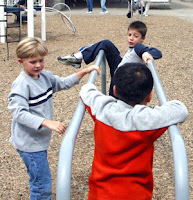Helping Aspergers Students Cope with Recess

"My son’s teacher told me that he gets nervous and often goes into a meltdown at recess time. During recess, the students usually either go to the gym or outside for 'free-time' recreation. How can I help him deal with this transition and the unstructured nature of 'free-time', thus avoiding a meltdown?" Recess is a time when students traditionally run-off their stress, but this transition can be very challenging for a student with Aspergers or High-Functioning Autism. Students are given instructions, rules and a timetable to guide them through the rest of the day, but recess is rather unstructured, and it can be difficult for Aspergers students to know what to do during this time. Playgrounds are also often noisy and crowded places, with lots of children running around screaming and talking loudly. This can be daunting for a special needs youngster who is not aware of the "hidden" social rules of recess. Here are some suggestions that

